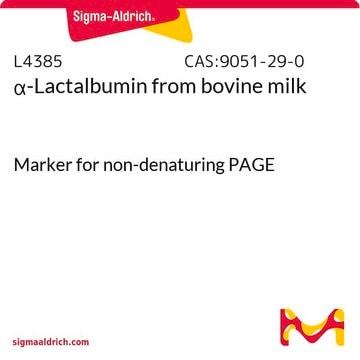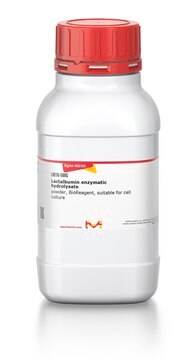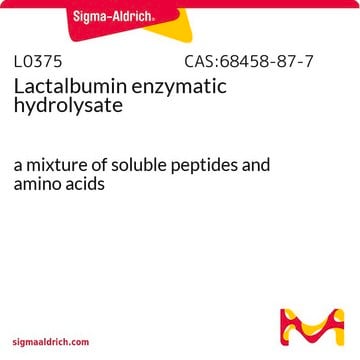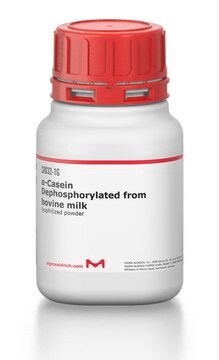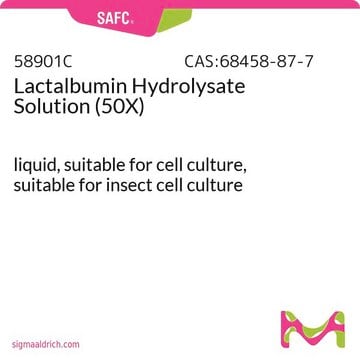Recommended Products
biological source
bovine
form
powder
technique(s)
cell culture | insect: suitable
UniProt accession no.
storage temp.
2-8°C
Gene Information
bovine ... LALBA(281894)
Related Categories
General description
α-Lactalbumin is a small, globular, whey protein that has been found in all milk studied to date. It is a metalloprotein of approximately 14 kDa produced in the mammary glands.
Application
α-Lactalbumin was used in a cytologic assay for diagnosis of food hypersensitivity in patients with irritable bowel syndrome.
Lactalbumin has also been used in rearing anopheline mosquitoes.
Biochem/physiol Actions
α-Lactalbumin consists of a single polypeptide chain with 8 cysteines which form disulfide bridges. α-Lactalbumin binds several metal ions, including calcium, which is thought to play a role in the regeneration of native α-lactalbumin from the reduced, denatured form. α-Lactalbumin also has a distinct zinc binding site that is thought to play a role in the binding of the lactose synthase complex. The mature protein consists of 123 amino acid residues (14 kDa), and it has a three-dimensional structure with 1.7 Angstrom resolution, demonstrating four a-helices and a triple stranded antiparallel β-sheet.
Storage Class
11 - Combustible Solids
wgk_germany
WGK 3
flash_point_f
Not applicable
flash_point_c
Not applicable
ppe
Eyeshields, Gloves, type N95 (US)
Certificates of Analysis (COA)
Search for Certificates of Analysis (COA) by entering the products Lot/Batch Number. Lot and Batch Numbers can be found on a product’s label following the words ‘Lot’ or ‘Batch’.
Already Own This Product?
Find documentation for the products that you have recently purchased in the Document Library.
Customers Also Viewed
Petter Storm et al.
PloS one, 8(3), e58578-e58578 (2013-03-19)
Ion channels and ion fluxes control many aspects of tissue homeostasis. During oncogenic transformation, critical ion channel functions may be perturbed but conserved tumor specific ion fluxes remain to be defined. Here we used the tumoricidal protein-lipid complex HAMLET as
Y-B Zhang et al.
Cell death & disease, 4, e550-e550 (2013-03-23)
HAMLET is a complex of oleic acids and decalcified α-lactalbumin that was discovered to selectively kill tumor cells both in vitro and in vivo. Autophagy is an important cellular process involved in drug-induced cell death of glioma cells. We treated
C S James Ho et al.
PloS one, 7(12), e53051-e53051 (2013-01-10)
HAMLET (Human Alpha-lactalbumin Made LEthal to Tumor cells) is the first member in a new family of protein-lipid complexes with broad tumoricidal activity. Elucidating the molecular structure and the domains crucial for HAMLET formation is fundamental for understanding its tumoricidal
Takashi Nakamura et al.
The Journal of biological chemistry, 288(20), 14408-14416 (2013-04-13)
Although HAMLET (human α-lactalbumin made lethal to tumor cells), a complex formed by human α-lactalbumin and oleic acid, has a unique apoptotic activity for the selective killing of tumor cells, the molecular mechanisms of expression of the HAMLET activity are
Infection of mosquitoes with Plasmodium spp. in monkeys
Collins WE, et al.
Methods IN Malaria Research, 144-144 (2008)
Our team of scientists has experience in all areas of research including Life Science, Material Science, Chemical Synthesis, Chromatography, Analytical and many others.
Contact Technical Service



